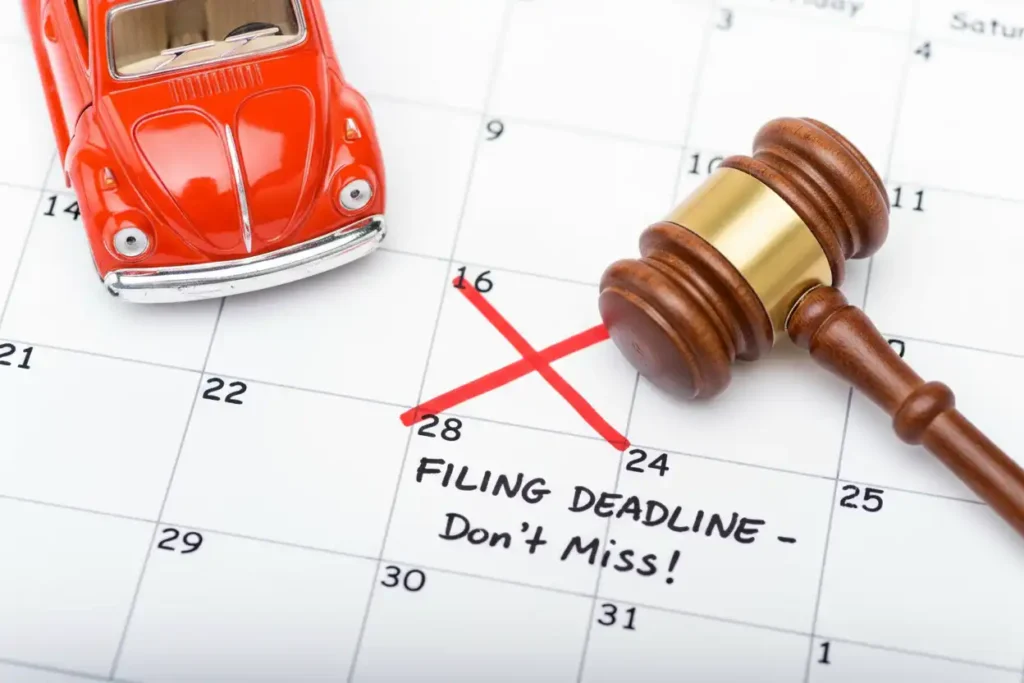How Long After a Car Accident Can You File a Personal Injury Claim in 2025?
If you’ve been in a car accident, time isn’t just money — it’s a matter of legal rights. Understanding how long after a car accident you can file a claim is crucial to ensuring you don’t miss your opportunity for compensation. Every state enforces a statute of limitations that determines how long victims have to take legal action after an accident. Missing that deadline can mean losing your right to recover damages completely.
In this article, we’ll break down the 2025 deadlines for car accident claims, explain why timing matters, and outline what steps to take immediately after a crash to protect your rights.
1. What Is the Statute of Limitations for Car Accident Claims?
The statute of limitations is the legal deadline to file a lawsuit after an injury. It varies from state to state, typically ranging between one and three years from the date of the accident. Some states offer longer windows for specific situations, such as hit-and-run cases or accidents involving government vehicles.
Here are a few examples:
- California: 2 years from the date of injury
- Texas: 2 years from the date of the crash
- New York: 3 years from the accident date
- Florida: 2 years (reduced in 2023 from 4 years)
Knowing your state’s specific deadline is vital. If you’re uncertain, contact an experienced car accident lawyer to confirm your filing rights.
2. Why Timing Matters After a Car Accident
Even though two years may sound like plenty of time, waiting too long can hurt your case. As weeks and months pass, evidence can disappear — witness memories fade, surveillance footage is deleted, and vehicle damage gets repaired. Insurance companies may also use delays to argue that your injuries aren’t as severe as claimed.
By filing promptly, you preserve strong evidence and demonstrate that your injuries were serious enough to require immediate legal attention.
3. When Does the Clock Start Ticking?
In most states, the clock begins on the date of the accident or the date the injury was discovered. The latter applies in cases where symptoms appear later — such as whiplash, concussions, or spinal injuries. This rule is known as the discovery of harm doctrine.
For instance, if you suffered back pain that worsened months after your crash and was later linked to your accident, your filing deadline may begin from the date of diagnosis rather than the crash itself. Always document your medical timeline carefully.
4. Exceptions to the Filing Deadline
There are certain circumstances where filing deadlines may be extended:
- Minor victims: The statute of limitations usually starts once the victim turns 18.
- Incapacitated victims: If a person is mentally or physically unable to file, the clock may pause until recovery.
- Government-related accidents: Claims involving city, county, or federal vehicles often require filing within 6 months.
Because exceptions vary by state, missing even a minor procedural step can cost you your claim. It’s best to consult with an attorney early, especially if you’re unsure which timeline applies.
5. Steps to Take Immediately After a Car Accident
Filing deadlines aren’t the only reason to act quickly. Taking these steps ensures you build a solid foundation for your claim:
- Seek medical attention: Your health comes first, and medical documentation is key evidence.
- Report the crash: Always call the police and obtain a copy of the official report.
- Notify your insurer: Most policies require immediate notification, often within 24–48 hours.
- Preserve evidence: Keep all bills, repair estimates, photos, and correspondence.
- Consult a lawyer: Legal professionals can help file before the deadline and negotiate fair settlements.

6. How Insurance Deadlines Differ from Legal Deadlines
Insurance claims and lawsuits follow different rules. Most insurance companies require you to report an accident within days — not years. Failing to report promptly can lead to denied coverage, even if your state law allows more time to sue.
Additionally, insurance adjusters often start building their defense immediately. Reporting quickly helps you maintain control of your narrative and ensures your damages are documented before repairs or medical treatment fade from record.
7. The Role of Medical Evidence in Timing
Insurance companies often argue that delayed treatment means your injury wasn’t serious. The sooner you seek care, the easier it is to connect your injury to the accident. Keep a detailed log of doctor visits, diagnoses, and medications. This medical paper trail supports your case and demonstrates compliance with treatment recommendations.
If you’re unsure when to see a specialist, visit our Accident Advocate Blog for more articles on injury recovery and insurance communication tips.
8. How Long After a Car Accident Can You File a Property Damage Claim?
Personal injury and property damage claims have different deadlines. Most states allow a slightly longer window — often up to three years — for property damage. Still, filing both claims together streamlines the process and strengthens your position when negotiating settlements.
Always include repair estimates, receipts, and proof of diminished vehicle value when filing. If your car is totaled, your lawyer can also help ensure fair compensation for its market value rather than the insurance company’s first offer.

9. What Happens If You Miss the Deadline?
If you miss the filing deadline, your case is typically dismissed by the court. Even if your injuries are severe, the law rarely allows exceptions unless you qualify under special conditions such as delayed discovery or legal disability. That’s why understanding how long after a car accident you can file a claim is essential.
If you believe you’re close to the deadline, speak with an attorney immediately. Some lawyers can file expedited complaints to preserve your claim while gathering the remaining evidence.
10. The Importance of Legal Help
Car accident cases can get complicated, especially when multiple parties or insurance companies are involved. A personal injury attorney ensures all paperwork is filed correctly and on time, investigates liability, and negotiates fair compensation for your medical bills, lost income, and pain and suffering.
Most accident lawyers work on contingency — meaning they only get paid if you win. To find out if your case qualifies.
Helpful Resources
- NHTSA – Traffic Crash Data & Safety Insights
- Insurance Information Institute – What to Do After a Car Accident
- Accident Advocate Blog – Legal Advice & Claim Guidance
Final Thoughts
Understanding how long after a car accident you can file a claim could be the key to securing your compensation. Deadlines are strict, but with proper documentation and early action, you can protect your rights and maximize recovery. Don’t wait until time runs out — take the first step toward justice today.
File smart. Stay informed. Advocate for your recovery with Accident Advocate.




